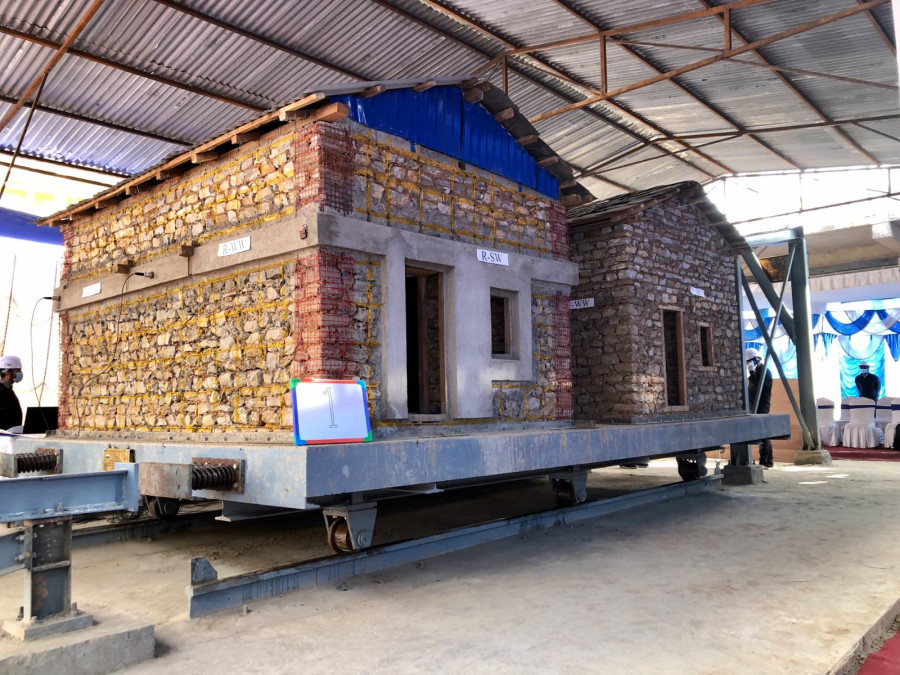Money
UNDP establishes ‘shock table testing facility’ in Pulchowk Campus
The new facility is the first of its kind in the country.
Post Report
The United Nations Development Programme (UNDP) with the financial support of the government of India on Monday established a 'shock table testing facility' on the premises of Tribhuvan University Institute of Engineering, Pulchowk Campus.
The facility is built in collaboration with the Department of Urban Development and Building Construction (DUDBC) under the Ministry of Urban Development and Institute of Engineering. It aims to strengthen the capacity of the engineering campus for research and academic works on safer construction and retrofitting techniques.
Under close guidance of the experts, UNDP constructed the Shock Table, which is first of its kind in Nepal, as a national research facility that will allow assessment of seismic performance of buildings and structures made of similar materials.
A 20-tonne payload capacity Shock Table of size 6m x 3.6m has been constructed in Pulchowk campus.
The shock table facility was inaugurated by Minister for Urban Development Ram Kumari Jhakri on Monday amid a function at the engineering campus.
Speaking at the programme, Jhakri said the scientific technology and the academic research support would be helpful in making Nepali homes safer. “Many of us were born in non-engineered traditional mud-mortar houses like the one that has been put on test here at the shock table,” she said.
Underscoring the need for doing more work on improving the safety of millions of houses in Nepal, she said that the government would provide needful support to expand the research facility and its application.
Addressing the event, Karun Bansal, first Secretary of Development Projects and Reconstruction at Embassy of India in Kathmandu, said that the facility, which is part of the larger post-earthquake support provided by India to Nepal,would help strengthen the capacity of Nepal government in building earthquake resilience.
“UNDP has accumulated vast knowledge about building’s behaviours during an earthquake, which entails that other than real earthquake experiences, numerical modelling and experimental testing are the two methods to understand buildings’ behaviour during an earthquake. Numerical analysis provides an alternative to the experimental investigation,” said Bernardo Cocco, deputy resident representative of UNDP.
“This facility is critical for testing of vernacular construction and earthquake resilient buildings constructed using locally available materials that could be used especially for the construction of private and public buildings in Nepal,” he said
As part of the reconstruction process initiated after the 2015 mega earthquake, over 50,000 private houses have been constructed in Gorkha and Nuwakot with the funding from the Government of India.
UNDP and United Nations Office for Project Services (UNOPS) were engaged by the Indian government in March 2018 to provide socio-technical facilitation and consultation (STFC) services to these 50,000 earthquake affected households. The Indian government committed $150 million as a post-earthquake assistance package for the housing sector to provide financial and technical support for reconstruction of 50,000 beneficiaries, including a $100 million grant and $50 million under our Fourth Line of Credit.
The physical testing of seismic performances of the retrofitted and non-retrofitted model houses on the Shock Table will provide a base to expand options and techniques of retrofitting across Nepal.
A study shows there are more than two million private houses at risk of collapse in case of an earthquake and they could be made safer, while keeping intact their ancient designs and architectures, by using retrofitting technology.
The shock table testing facility is expected to be instrumental in identifying appropriate retrofitting technologies that will be needed to make Nepal’s traditional houses safer and resilient.
The performance of the models will be evaluated from the observations and post-processing of the acquired data. All experimental testing work will be completed by UNDP engineers under the guidance of Technical Experts involved in the assignment.
The operation and maintenance of the Shock Table Facility will be carried out in accordance with the provisions of the tripartite Memorandum of Understanding (MOU) signed between UNDP, Department of Urban Development and Building Construction and engineering campus in August 2019 and as per the approved Shock Table Testing Facility Working Procedure.




 9.7°C Kathmandu
9.7°C Kathmandu














